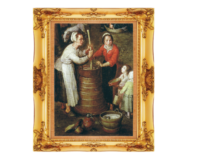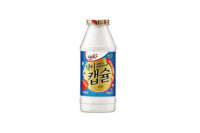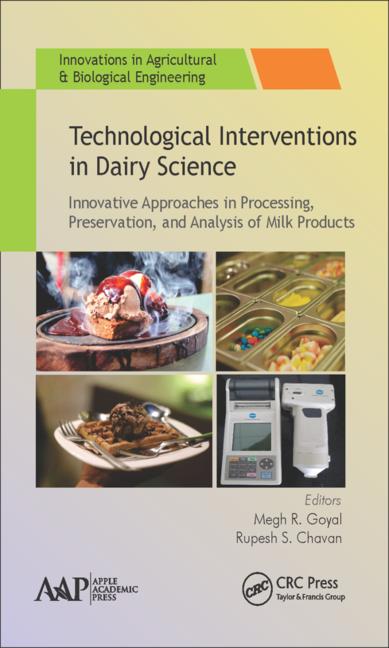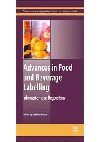Live and Active in Londonderry
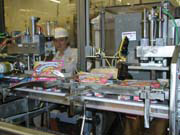
It's a far cry from the hand-filled single-vat system the company used in its infancy, and even from the more modern vat-based system that was used until 1998. As Stonyfield's business has grown (at an average rate of more than 20% a year) its production facility has kept in step, growing in its square footage, in its sophistication, and in its efficiency.
"Around 1997 we knew that our systems were maxed out," says John Daigle, v.p. of operations. At that time we were using a dependent batch system, and we needed to evolve to a higher level of automation and go to a continuous process system."
The plant was shut down for about four days in 1998 during the installation of the continuous process system. The total project took about eight months to complete. The result is an efficient, flexible plant that has been able to grow with the company.

Processing for organic and natural
Stonyfield receives an average of six truckloads of raw milk daily through a single-bay receiving dock. Organic milk from Organic Valley Cooperative is generally accepted first in the day and conventional milk later. The organic milk comes primarily from O.V. member farms in the New England area. Conventional milk is procured from a number of local sources. Stonyfield pays a premium on all its raw milk for the assurance that producers do not treat their cows with rBGH. There are six raw milk silos, which have a combined capacity of about 120,000 gals. The organic and conventional milk is segregated into different silos.
"We bring the milk in and separate it into cream and low fat, we add milk solids and sugar for the base," Daigle says. "We add those continuously and then pasteurize, and/or homogenize. Then we cool it and add the cultures."
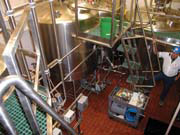
Once the product has been processed, and cooled, and the cultures are added, it is stored in a cold tank. When a production line is started the correct base is drawn from a tank and heated for filling, beginning the incubation process.
The entire process system was designed by Zajac LLC, Portland, Maine, to allow Stonyfield to segregate the organic processing and to facilitate a production schedule serving two distinct customer bases, Daigle says.
"It's controlled with a custom-designed control software package using Rockwell RS View on an Allen-Bradley PLC. One of the challenges in producing organic and natural products is that you have to segregate the organic product, but you also need to be able to run based on sales need.
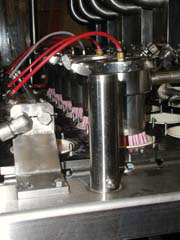
That's where the importance of the process control system comes in.
"The process system we have basically keeps track of that," Daigle says. "It knows that you can't put organic on top of a conventional product. When we go to the filler we put in an SKU number and it knows what kind of base it needs. It won't allow you to bring conventional product over if you are running organic."
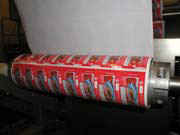
Cups Tubs and Tubes
The continuous process system is used for all the lines with the exception of a single vat batch line that feeds the form-fill-seal machine used to produce Squeezers, the tube yogurt or stick pack product targeted at kids.For the continuous lines, fruits and flavors are added to the product stream at the filler, either in the cup for fruit on the bottom or in the stream for blended flavors.
There are three lines used primarily to filling 6-oz single serve cups. One of those lines is a 2 by 6 which fills 12 rows simultaneously with 12 filling heads. The others are a six-lane filler and an eight. Four-ounce cups for multipacks can also be run on one of the six-lane fillers.
A fourth line is dedicated to quarts, and a fifth is used strictly for filling 4-oz cups for multipacks. On the multipack line, cups are bundled into 4 or 6 packs, depending on the product. On the 6-oz lines, cups are primarily packaged into cases of 12 for shipping.
A 6-lane quart line fills up to about 6,000 quarts an hour. Quarts are packaged in cases of six.
All the filling equipment is manufactured by Modern Packaging.

Foil or plastic seals are heat applied as the cups and tubs exit the fillers. Lids are still applied to quarts, but in an effort to reduce consumer waste, plastic lids have been eliminated from all the other product lines.
Stonyfield uses several different types of cups including a new clear plastic cup for the Moo-la-la whole milk dessert yogurt, but the machines are easily adapted to different cup configurations.
On the Squeezers line, the yogurt is batched in a 1,000-gal tank after HTST. When the pH is right, it's cooled in the tank and then piped to an 8-lane form-fill-seal machine from Hassia. Two different flavors are added through separate flavor injectors. The line runs about 400 tubes a minute. The tubes pass through a metal detector and are then bundled into cartons, with 8 tubes in a carton, four of each flavor. A checkweigher ensures that each carton has the right number of tubes and the cartons are then boxed eight to a case. Finished cases spend about two hours in a modified ice cream hardener and are then ready for the refrigerated warehouse.
After being filled, and bundled into secondary packaging, cups and tubs are then conveyed to an automated palletizer in an incubation room. Pallets are held in the incubation room for about 3-5 hours. Once the incubation is complete, the product is transferred to chill cells. Two rows of chill cells, with each cell designed to hold a single pallet, are used to bring the product down to storage temperature. This process takes about two hours.
The yogurt is kept refrigerated in a new 30,000 sq ft warehouse completed in October, and it's dispatched within a few days of manufacture.

Maintaining quality and integrity
Having the proper facilities is only half of the battle, of course, and it's up to Stonyfield's employees to provide the other half."We bring it right down to floor level," says Paul Meyer, Stonyfield's first shift production supervisor, while talking about production efficiency. "Every operator running a machine out here knows exactly how they are running each hour. It's pretty interesting when the employees are checking the numbers themselves and it's not just left up to supervisors or management."
Getting the line workers excited about efficiency and quality is a great concept for any manufacturing operation, but for Stonyfield it's essential, considering all the demands the company puts on itself.
Making ordinary yogurt is by nature more challenging than say, bottling milk, but Stonyfield doesn't make ordinary yogurt. Most of its product is organic, it's a high priced product, demanding strict quality control, and the company distributes coast-to-coast to two distinct customer bases-natural foods stores and traditional grocery stores.
Daigle says this presents more challenges for production scheduling and warehouse operations.
"We are handling national distribution out of New Hampshire, which makes it difficult to begin with, as we aren't exactly in the middle of the country," he says. "The natural foods stores will take small amounts of each SKU, where the traditional groceries take a truck load of fewer SKUs."

Meeting future growth
As Stonyfield is nearing the end of a transition to 100% organic products, some of the challenges faced by the operations department will go away, but new challenges will arise.There is little room for expansion in Londonderry, in part because of limits on water usage in the sensitive Merrimack River area. The Londonderry plant will continue to evolve, as some of its volume is transferred to the recently acquired Brown Cow facility in Antioch, Calif. The western facility could be easily expanded, Daigle says.
The company works to stay one step ahead of demand, and tries to anticipate when it will need to add equipment and capacity.
"We really can't slow down," Daigle says, "So we need to make those improvements ahead of time and have things up and running before we get to where we need it."
Plant Facts
Location: Londonderry, N.H.Size: 135,000 sq ft
Number of Lines: Six
Operation: Seven days a week
Product: Cups, quarts and tubes of yogurt
Plant employees: 130
Stonyfield Farm Vendors:
Fillers: Modern Packaging Inc.www.modernpackaginginc.com
631/595-2437
Packaging: Polytainers Inc.
www.polytainersinc.com
416/239-7311
Fruit Preps: Atys U.S.
www.atys-group.us
800/477-3788
Fruits/flavors: Concord Foods
www.concordfoods.com
508/580-1700
Organic Milk: Organic Valley
www.organicvalley.com
888/444-6455
Probiotic Cultures: Orafti Active Food Ingredients
www.orafti-us.com
610/889-9828
Looking for a reprint of this article?
From high-res PDFs to custom plaques, order your copy today!




